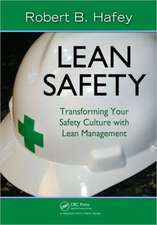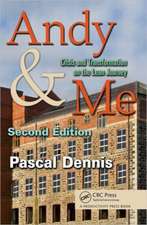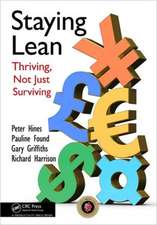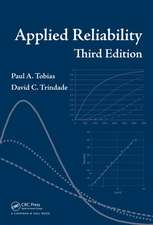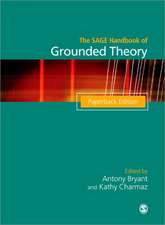Intellectual Capital for Communities
Autor Ahmed Bounfour, Leif Edvinssonen Limba Engleză Paperback – 21 ian 2005
| Toate formatele și edițiile | Preț | Express |
|---|---|---|
| Paperback (1) | 387.79 lei 5-7 săpt. | |
| Taylor & Francis – 21 ian 2005 | 387.79 lei 5-7 săpt. | |
| Hardback (1) | 764.20 lei 6-8 săpt. | |
| Taylor & Francis – sep 2016 | 764.20 lei 6-8 săpt. |
Preț: 387.79 lei
Preț vechi: 615.16 lei
-37% Nou
Puncte Express: 582
Preț estimativ în valută:
74.21€ • 80.58$ • 62.34£
74.21€ • 80.58$ • 62.34£
Carte tipărită la comandă
Livrare economică 15-29 aprilie
Preluare comenzi: 021 569.72.76
Specificații
ISBN-13: 9780750677738
ISBN-10: 0750677732
Pagini: 364
Ilustrații: Illustrated
Dimensiuni: 152 x 229 x 22 mm
Greutate: 0.67 kg
Ediția:1
Editura: Taylor & Francis
Colecția Routledge
Locul publicării:Oxford, United Kingdom
ISBN-10: 0750677732
Pagini: 364
Ilustrații: Illustrated
Dimensiuni: 152 x 229 x 22 mm
Greutate: 0.67 kg
Ediția:1
Editura: Taylor & Francis
Colecția Routledge
Locul publicării:Oxford, United Kingdom
Public țintă
Professional Practice & DevelopmentCuprins
Introduction by Ahmed Bounfour and Leif Edvinsson
Part One: Modelling and contextualising IC for Communities
Chapter 1: Modelling Intangibles: Transaction Regime Versus Community regimes
, Ahmed Bounfour
Chapter 2: Regional Intellectual capital in waiting, Leif Edvinsson
Part Two : IC for Nations
Chapter 3: Estimating the Level of Investment in knowledge across OECD countries, Mosahid Khan
Chapter 4: Knowledge Economies: a Global Perspective, Jean-Eric Aubert, World Bank Institute
Chapter 5: Investing in Intangibles: Is a Trillion Dollars Missing from the GDP?
Leonard Nakamura, Federal Reserve Bank of Philadelphia
Chapter 6: Intangibles and Intellectual Capital in the European Investment Bank Project Appraisal, Jean-Jaques Mertens , European Investment Bank and Jacques Van der Meer
Chapter 7 : Assessing Performance of European Innovations Systems: An Intellectual Capital Indexes Perspectives, Ahmed Bounfour,University of Marne La Vallee
Chapter 8: National Intellectual Capital Index, The Benchmarking of Arab Countries
Dr. Nick Bontis, DeGroote Business School, McMaster University
Chapter 9 : The Intellectual Capital of The State of Israel, Dr. Edna Pasher and Sigal Shachar
Chapter 10 : Rethinking leadership in the Knowledge Society, Learning from Others: How to Integrate Intellectual and Social Capital and Establish a New Balance of Value and Values, Bernhard Von Mutius, Germany
Chapter 11: Japan and Other East Asian Economies under the Knowledge-Based Economy,
Seiichi Masuyama, Nomura Research Institute, Japan and Asia
Part Three : IC for Regions
Chapter 12: Value Creation Efficiency at National and Regional Level – Case Study Croatia and EU, Ante Pulic
Chapter 13: A European regional path to the knowledge economy: challenges and opportunities, Dr Dimitri Corpakis, Head of Sector
European Commission DG Research
Chapter 14: Intellectual Capital Creation in Regions : A Knowledge System Approach
Anssi Smedlund and Aino Pöyhönen, M.Econ.Sc. Anssi Smedlund is a Research Assistant and PhD Candidate of Knowledge Management in the Department of Business Administration at Lappeenranta University of Technology
Chapter 15: Ragusa or how to measure ignorance: The ignorance meter
By Klaus North and Stefanie Kares, University of Applied Sciences, Wiesbaden, Germany
Chapter 16: Can the state stimulate the creation of regional networks? – Experiences from the Virtual Marketplace Bavaria initiative,
Hans-Joachim Heusler , Hans Schedl
Chapter 17: The Region's Competence and Human Capital: Lessons from the Collaboration Between 3 European Regions on Competence Mapping and Intellectual Capital Management, Lars Karlssson and Paolo Martinez
Part Four
IC for Cities and Local Communities
Chapter 18: Learning-by-Playing: Bridging the Knowing-Doing Gap in Urban Communities, Albert A Angehrn INSEAD, The European Institute of Business Administration
Chapter 19: Cities’ Intellectual Capital Benchmarking System (CICBS). A methodology and a framework for measuring and managing intellectual capital of cities: A practical application in the city of Mataró, by José María Viedma Marti Polytechnic University of Catalonia and
President of Intellectual Capital Management Systems
Chapter 20 IC for Communities, Research and Policy agenda, Ahmed Bounfour
Index
Part One: Modelling and contextualising IC for Communities
Chapter 1: Modelling Intangibles: Transaction Regime Versus Community regimes
, Ahmed Bounfour
Chapter 2: Regional Intellectual capital in waiting, Leif Edvinsson
Part Two : IC for Nations
Chapter 3: Estimating the Level of Investment in knowledge across OECD countries, Mosahid Khan
Chapter 4: Knowledge Economies: a Global Perspective, Jean-Eric Aubert, World Bank Institute
Chapter 5: Investing in Intangibles: Is a Trillion Dollars Missing from the GDP?
Leonard Nakamura, Federal Reserve Bank of Philadelphia
Chapter 6: Intangibles and Intellectual Capital in the European Investment Bank Project Appraisal, Jean-Jaques Mertens , European Investment Bank and Jacques Van der Meer
Chapter 7 : Assessing Performance of European Innovations Systems: An Intellectual Capital Indexes Perspectives, Ahmed Bounfour,University of Marne La Vallee
Chapter 8: National Intellectual Capital Index, The Benchmarking of Arab Countries
Dr. Nick Bontis, DeGroote Business School, McMaster University
Chapter 9 : The Intellectual Capital of The State of Israel, Dr. Edna Pasher and Sigal Shachar
Chapter 10 : Rethinking leadership in the Knowledge Society, Learning from Others: How to Integrate Intellectual and Social Capital and Establish a New Balance of Value and Values, Bernhard Von Mutius, Germany
Chapter 11: Japan and Other East Asian Economies under the Knowledge-Based Economy,
Seiichi Masuyama, Nomura Research Institute, Japan and Asia
Part Three : IC for Regions
Chapter 12: Value Creation Efficiency at National and Regional Level – Case Study Croatia and EU, Ante Pulic
Chapter 13: A European regional path to the knowledge economy: challenges and opportunities, Dr Dimitri Corpakis, Head of Sector
European Commission DG Research
Chapter 14: Intellectual Capital Creation in Regions : A Knowledge System Approach
Anssi Smedlund and Aino Pöyhönen, M.Econ.Sc. Anssi Smedlund is a Research Assistant and PhD Candidate of Knowledge Management in the Department of Business Administration at Lappeenranta University of Technology
Chapter 15: Ragusa or how to measure ignorance: The ignorance meter
By Klaus North and Stefanie Kares, University of Applied Sciences, Wiesbaden, Germany
Chapter 16: Can the state stimulate the creation of regional networks? – Experiences from the Virtual Marketplace Bavaria initiative,
Hans-Joachim Heusler , Hans Schedl
Chapter 17: The Region's Competence and Human Capital: Lessons from the Collaboration Between 3 European Regions on Competence Mapping and Intellectual Capital Management, Lars Karlssson and Paolo Martinez
Part Four
IC for Cities and Local Communities
Chapter 18: Learning-by-Playing: Bridging the Knowing-Doing Gap in Urban Communities, Albert A Angehrn INSEAD, The European Institute of Business Administration
Chapter 19: Cities’ Intellectual Capital Benchmarking System (CICBS). A methodology and a framework for measuring and managing intellectual capital of cities: A practical application in the city of Mataró, by José María Viedma Marti Polytechnic University of Catalonia and
President of Intellectual Capital Management Systems
Chapter 20 IC for Communities, Research and Policy agenda, Ahmed Bounfour
Index
Descriere
In the knowledge economy, the value of corporations is directly related to their knowledge and intellectual capital. But broaden the perspective a little wider and you begin to see the possibilities: Think of cities, regions, even entire nations, in addition to the public sector. If intangibles and intellectual capital are important to the private sector, they are also important to the productivity and competitiveness of the public sector, and so to communities and nations as a whole. In this book, Editors Ahmed Bounfour and Leif Edivinsson have brought together the best minds in intellectual capital throughout the world to focus on a new and fertile area of research: measuring and managing the intellectual capital of communities. This is a creative and cutting-edge area of research that has the potential to change how public sector planning and development is done. Once there is a clear way to identify where wealth is created in a given region/nation, this process has the potential to reveal a huge knowledge repository in the public sector with a significant—but idle—potential for collective wealth creation—the wealth of nations in waiting.
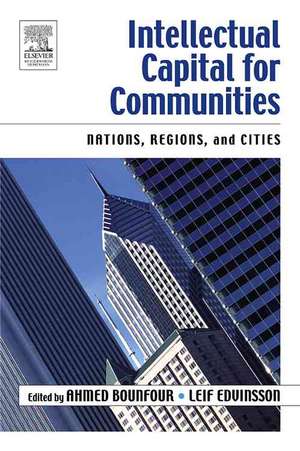
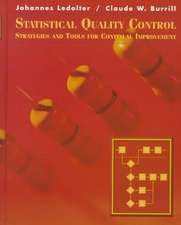

![Using Hoshin Kanri to Improve the Value Stream [With CDROM]: From Theory to Practice](https://i3.books-express.ro/bt/9781420084238/using-hoshin-kanri-to-improve-the-value-stream-with-cdrom.jpg)





